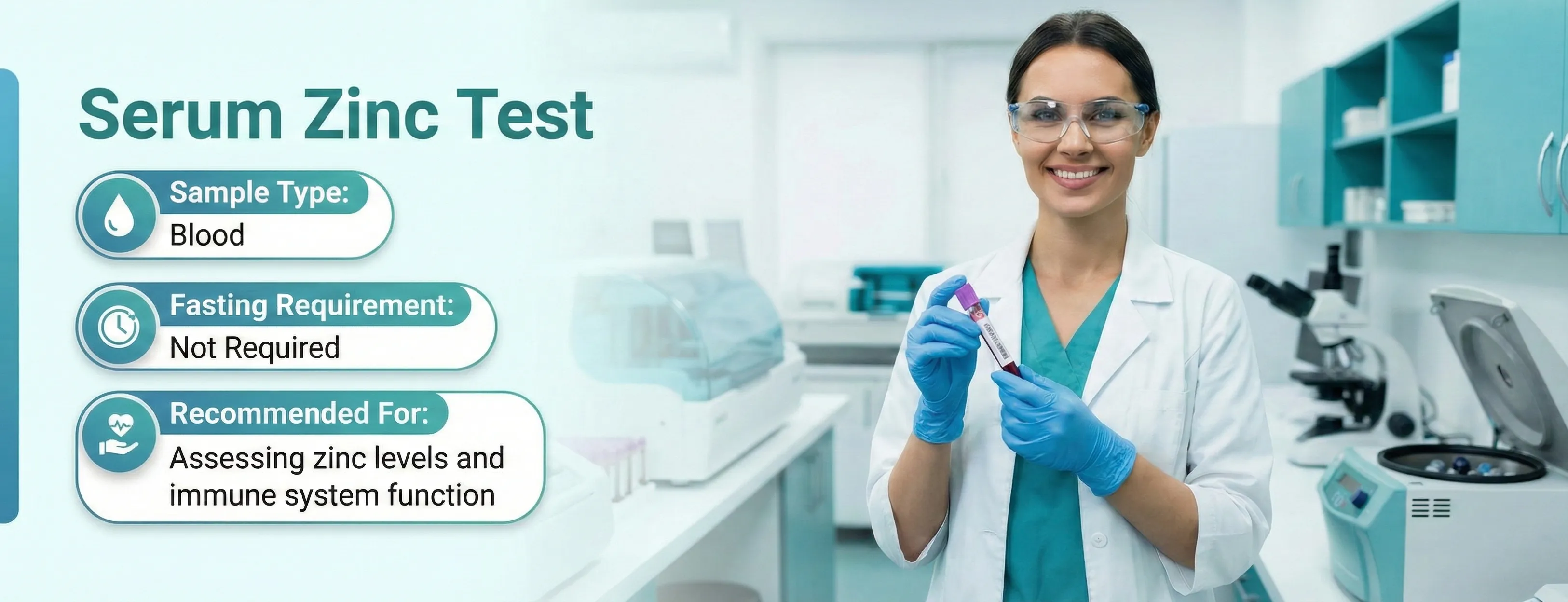185+ orders placed in your location
100% NABL & ISO Certified Lab • 100% Accurate Reports
Serum Zinc Test
Zn serum, Zinc serum, Zinc S
- SummaryThe Serum Zinc test measures the level of zinc in the blood, an essential mineral important for immune function, wound healing, cell growth, and enzyme activity. It helps detect zinc deficiency or toxicity. The test is performed using a blood sample, and fasting for 8–10 hours is typically recommended to ensure accuracy, avoiding zinc supplements for 24 hours prior.Read more
- Reports Within34 HrsView Sample Report100% NABL & ISO Certified Labs
- SampleBlood
- AgeAll Age Group
- GenderMale and Female
- FastingNot Required
PharmEasy Promises
Know More About The Test
A quick info on Serum Zinc Test
Overview
Zinc is an essential mineral that enhances the immune system's ability to respond effectively. Zinc is involved in cell division, growth, wound healing, and carbohydrate disintegration. Zinc is also a critical component of over two hundred enzymes, involved in a wide range of bodily functions. It is an essential component in smell and taste functions.
Zinc is a vital cofactor in the enzymatic actions of:
- Carbonic anhydrase
- Alkaline phosphatase
- RNA and DNA polymerases
- Alcohol dehydrogenase
Absorbed zinc through the diet gets utilised in hormonal synthesis. Zinc depletion affects peptidases, kinases and phosphorylase. Zinc enhances the healing process in the tissues.
Zinc depletion occurs when:
- Zinc is not absorbed from the diet.
- Excess copper or iron interfere with zinc absorption.
- Loss of zinc occurs after absorption.
- Diet is deficient in zinc.
- Zinc is not available for absorption (when it is bound to fibre).
- Loss of zinc occurs through open wounds or gastrointestinal loss after absorption.
- You have burns.
People who consume alcohol in large quantities are at risk of zinc deficiency. Some factors like smoking and contraceptive pills too contribute to zinc reduction.
Pregnant women require more zinc since the zinc in their bodies is essential for the growth of the baby in the womb. Zinc deficiency leads to growth restrictions in babies. The deficiency might also make it difficult for women to get pregnant.
In children, zinc deficiency causes:
- Growth retardation
- Susceptible to infections
- Delayed sexual maturation
- Diarrhoea
Common causes of zinc toxicity include:
- Cleaner and solvents
- Rust removing agents
- Paints and varnishes
- Industrial exposure
- Supplements
Excess of zinc is harmful to the body. An excess amount of zinc interferes with copper absorption, which can cause hypocupremia.
Zinc intake recommendations and other nutrients are given in the dietary reference intakes developed by the food and nutrition board. These values vary according to age and gender. Recommended dietary allowance is the average daily level of zinc intake sufficient to meet the nutrient needs. Adequate intake is essential to meet nutritional adequacy.
Risk Assessment
Burns, Ulcerative colitis, Crohn's disease, Carcinoma, Enteritis
What does this Test Detect?
The serum zinc test measures the levels of serum zinc in the blood sample. Serum zinc results help in assessing zinc deficiencies.
Routinely serum zinc is tested as a routine screening:
- In couples planning for pregnancy
- In pregnant women
- In newborn
- In people with a history of chronic alcohol consumption
Indications for Serum Zinc Test
A serum zinc test is indicated if a person is experiencing the following symptoms of zinc deficiency:
- Impaired immune system
- Repeated infections
- Altered sense of taste, sight and smell
- Trouble viewing in the dark
- Impaired testosterone production
- Hypogonadism in males
- Multiple skin lesions
- Skin lesions/Dry, scaling skin
- Impaired wound healing
- Delay in growth
- Hair loss/Alopecia
- Poor appetite
- Diarrhoea
The following symptoms are an indication for serum zinc test:
- Lethargy
- Ataxia
- Chest pain
- Nausea
- Severe abdominal pain
- Seizures
- Dizziness
- Vomiting
- Coughing
- Fatigue
- Muscle pain
- Nausea
- Fever
- Headache
Some disease conditions for which serum zinc values need to be measured are:
- Hepatic cirrhosis
- Ulcerative colitis
- Crohn disease
- Regional enteritis
- Sprue
- Intestinal bypass
- Neoplastic disease
- Increased catabolism induced by anabolic steroids.
- Anorexia
- Starvation
- Burns
- Peptic and gastric ulcer
Considering serum zinc chart values, the doctor will determine the treatment of zinc deficiency or zinc excess. The serum zinc test procedure is applicable for males and females, both adults and children.
Along with medicinal treatment, adding food rich in zinc also helps in overcoming zinc deficiency. Foods such as oysters, beans, cereals, chicken, yoghurt, pumpkin seeds, oatmeal, almonds, and milk are helpful.
How Frequently should you take this Test?
Like most mineral deficiencies, serum zinc low-level treatment takes time. Therefore, to monitor the level and to check on the treatment plan, the doctor is most likely to repeat your test after three months. A serum zinc test may be prescribed every three months to monitor and regulate the dosage of medicine.
This 3-month check-up will give a sign if the level is increased, lowered, or maintained. The test can be annual only if not on any medication or the previous test results were within the normal range. In people whose serum zinc values are above or below the normal range, they must follow advice from the doctor.
Test Preparation
What to Expect During the Test
Before the Test
Normally, no special test preparation is necessary before undergoing a Serum Zinc test. However, if this test is conducted along with another test, your physician may advise you to abstain from certain foods. To ensure the most accurate results, seek guidance from a healthcare professional before proceeding with the test.
During the Test
A blood sample is procured from a vein in your arm. Your experience will unfold as follows:
- The area where the needle will be inserted will be sanitised with antiseptic lotion.
- A tourniquet band will be secured around the arm to expand the veins.
- A new syringe needle will be introduced into the vein to extract blood. This process may take a few moments, during which you may experience slight discomfort from the needle pricking.
- The blood sample will be preserved in a small vial or test tube along with your test particulars.
After the Test
Once the blood has been collected:
- A dressing will be applied to the needle insertion site to prevent bleeding.
- In some instances, minor soreness or dizziness may occur. You may be instructed to rest for a few minutes.
- Notify your physician if there is any bleeding, pain, or rash at the puncture site.
Parameters
The serum zinc results give an idea about the decrease and increase in the serum zinc values in the blood. In general, for men and women, a serum zinc test is recommended if there are symptoms of zinc deficiency. The serum zinc test includes only one parameter that is the level of zinc in the blood sample.
Ranges
The serum zinc range slightly varies in different age groups. Similarly, the serum zinc range is higher in males compared to females.
Reference | Interpretation |
Newborn | 49.5 - 99.7 Ug/dl |
School children | 63.8 - 110 Ug/dl |
Females | 70.0 - 114 Ug/dl |
Males | 70 - 127 Ug/dl |
People with a serum zinc normal range can follow a regular diet and don't need supplements.
The normal values and reference ranges of the test may vary from lab to lab. Please refer to the ranges mentioned in the report and consult a doctor to understand the interpretation of lab reports.
Test Result Interpretation
Serum zinc chart values vary according to age, gender and various laboratories. Serum zinc chart values are slightly higher in males than in females. Decreased level of serum zinc means zinc deficiency. Zinc deficiency could be due to:
- Decreased intake in the diet
- Decreased absorption
- Absorbed zinc is lost
Sometimes low serum zinc values are associated with some other disease. Serum zinc results may be low in the following diseases:
- Chronic alcohol addiction
- Blood cancer
- Inflammatory disease of the large intestine
- Inflammatory disease of the small intestine
- Infectious diarrhoea
- Dysentery
- Chronic kidney disease
- Chronic liver disease
- Crohn's disease
- Uncontrolled diabetes
- Pancreatic disease
- Sickle cell anaemia
- Ulcerative colitis
Increased level of serum zinc means zinc toxicity. Zinc toxicity could be due to
- Excess zinc supplements
- Exposure to Chemical solvents
- Inhaling rust removing agents
- Paints and varnishes
- Exposure to industrial zinc
Serum zinc charts with elevated values are rare, yet timely diagnosis and treatment can prevent multiple organ damages.
Risk and Limitations
The Serum Zinc test is a standard blood test that is generally safe and does not commonly result in complications. However, kindly contact your physician immediately if you encounter:
- Persistent bleeding from the needle insertion site.
- Pain or swelling at the site of blood collection.
Limitations of the test
- Possibility of errors caused by equipment or human factors.
- Risk of misinterpretation of the test markers.
Was This Test Information Helpful?
Please rate your experience
References
Health packages containing 'Serum Zinc Test'
People Also Ask
What is serum zinc level?
What is level 3 on zinc?
What happens if zinc is high in the body?
Have any doubts? Ask us.
Ask us anything about the Serum Zinc Test to understand it better
We provide trusted, expert-curated health content to support better awareness,prevention, and care.
Backed by experienced doctors, medical experts, and strict editorial standards.


